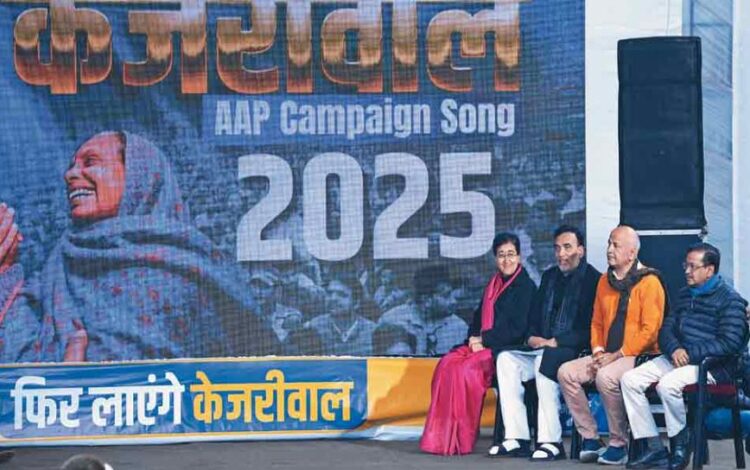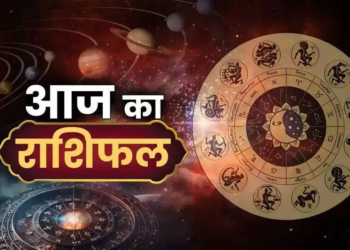Delhi elections are not one-sided this time, BJP showed strength and AAP is restless, but Congress’s claim is weak.
It is said that the wheel of time completes one full revolution in twelve years. The first government of Aam Aadmi Party was formed in Delhi in 2013. This government could not complete even fifty days with the support of minority and Congress, but it is undoubtedly recorded in the political history of the country that just one year after the formation of the party (November 2012), not only did AAP form the government in a state, but it also The leader also became the Chief Minister. Now, in the thirteenth year of the formation of the party and the twelfth year of the formation of the government for the first time, when the Aam Aadmi Party (AAP) has come out on the streets of Delhi for the fourth time to demand the mandate, it is finding itself entangled.
About two months before the Election Commission issued the notification for Delhi Assembly elections on January 10 of the new year, the election atmosphere had started spreading on the streets of the capital. On one hand, posters, hoardings and billboards of the opposition Bharatiya Janata Party (BJP) were seen taunting the AAP government, while on the other hand, AAP started holding meetings in the Assemblies under the name ‘Discussion on Rewari’. This was strange because AAP had defined free electricity and water as a right of the people, not as a privilege.
AAP leader, former Chief Minister Arvind Kejriwal said that his party will ask people whether they want Rewari or not. The formula to understand this question is visible in the pre-election announcements of the three major parties. This is where you are finding yourself trapped in your own “delivery model”.
rewari vs issue
BJP has promised 500 units of free electricity to temples and gurudwaras and 300 units to homes. Apart from this, monthly financial assistance of Rs 2,500 has been promised for women. This is even more strange because the party has been calling these services as useless and the people as beneficiaries. Not only was electricity and water free during your rule, it first announced Rs 2,100 per month and free health care to retain women voters. As the years passed, AAP mobilized religious leaders, Arvind Kejriwal and other party leaders appeared on the stage with babas and granthis and a monthly salary of Rs 18,000 was announced for the pandas.
Hope for change: Prime Minister Narendra Modi at BJP’s Parivartan Rally in Rohini, 5 January 2024
Congress, which was lying idle at a distant third place with four percent votes in the fight, had nothing to offer, so it also announced Rs 2,500 for women and Rs 25 lakh health insurance cover for all on the lines of Rajasthan. Announced and talked about giving allowance of eight and a half thousand rupees to unemployed youth. Congress leader Rahul Gandhi criticized Arvind Kejriwal for the first time in the first meeting in Seelampur on 13 January. He asked, “Why is Kejriwal silent on the issues of Adani, caste census, increasing the reservation limit?”
The biggest weakness and biggest strength of “politics of delivery” is the same thing. The more one gives, the more one will get. In this game of transactions, other issues of the people become secondary. In the last decade, the way BJP has managed this politics with the help of its central system and has made voters its “beneficiaries” with the funds of government schemes, the position of other parties seems weak. One effect of this is that issue politics is no longer possible because voters expect competitive benefits.
This is the reason why AAP had to start the discussion on Revdi. You have no other option politically and ideologically. He always described himself as “apolitical”. Under the guise of being “apolitical”, it did all the things that a nationalist or right-wing party is supposed to do, like making Delhi’s school curriculum imbued with patriotism or hoisting tricolor flags all over Delhi and taking out tricolor yatras. On the pitch of religion, monthly salary has now been announced for priests and granthis.
Similarly, both the parties are in conflict in the politics of delivery. But this situation is different from the 2020 elections because at that time the Shaheen Bagh movement and Delhi riots had united the Muslims with AAP and the election had become so polarized that the Congress’s vote count had come down from nine percent to four.
Today the difference between BJP and AAP is only fifteen percent votes. If BJP goes above forty percent and AAP slips below fifty percent, then the fight may get stuck. It is a different matter that even if AAP loses twenty seats, the government will be formed with the majority. This is the problem where Delhi’s elections this time hinge on allegations and counter-allegations of tampering and reduction in the voter list. This is unprecedented because before this neither BJP had looked so restless, nor had AAP ever said anything regarding voter lists. If you remember, the Delhi elections of 2015 and 2020 were almost flat, as if everyone was assuming that AAP would win. This time it is not so.
The great irony of Rewari politics is that if anyone looks at the streets of Delhi, he will feel that the elections are really being held on issues. All the posters, banners and hoardings put up by BJP and AAP have counter slogans like roads, electricity, health, Yamuna, dirt, sewer etc. That is, the psychological atmosphere is being created through issue-centric superficial propaganda but the voters are being directly wooed by the mob.
The question of the nose becoming a seat
Perhaps it is due to this uneasiness that the Aam Aadmi Party has complained to the Election Commission regarding frequent changes in voter lists. Interestingly, these complaints have been made only about the New Delhi Assembly from where Arvind Kejriwal contests, while the changes have been similar in other assemblies also. First of all, Chief Minister Atishi wrote a long letter to Central Election Commissioner Rajiv Kumar on January 5 and complained about about 13,000 names added to the voter list and about 6,000 names deleted from the New Delhi seat. There are around one lakh seven thousand registered voters in this assembly and AAP alleges that the names of about 6 percent voters have been deleted.
Arvind Kejriwal wrote a letter to the Election Commission on January 11 regarding exactly these complaints. The new allegation made in this was that BJP is getting its votes across the country linked through the addresses of its MPs and ministers in the New Delhi Assembly. In this regard, a delegation of AAP had gone to meet the Election Commission. It is said that Chief Election Commissioner Rajiv Kumar was not present.
This has strengthened the doubts whether the BJP has really tampered with the voter lists for electoral gains. According to Congress, names of about thirteen lakh voters have been removed from the lists in entire Delhi. About five lakh new voters have been added during the last two months. According to the Election Commission, this time the number of voters in Delhi has increased by five percent as compared to the 2020 assembly elections. What is the exact meaning of these figures and what are the electoral implications of the increase and decrease in voters, it can be understood from the claims and allegations of the parties, but from AAP’s side, only Kejriwal is repeatedly complaining about the assembly. This shows that this time BJP has special emphasis on New Delhi seat.
Trying to make space: Congress leader Rahul Gandhi at rally in Seelampur on 13 January
Perhaps that is why this time Congress has fielded Sandeep Dikshit, son of former Chief Minister Sheila Dikshit, on this VIP seat. Interestingly, a candidate is also contesting from this seat who was once a special donor and friend of Kejriwal. This is Dr. Munish Raizada, President of the Indian Liberal Party (BLP), who is not discussed much in the media. Dr. Munish was a pediatrician in America. When AAP stopped making public information about donations on its website in 2015, Munish launched a campaign in Delhi in the name of Donation Satyagraha.
Dr. Munish, who is running his office from BK Dutt Colony of New Delhi Assembly, is not at all worried about the addition and deletion of names in the voter list of his seat. Munish says that there is an uproar in New Delhi because all those fake voters have been removed with the help of which Kejriwal was continuously winning. He says, “Arvind alone will suffer because he was a bogus voter. That’s why they are shouting.
BJP supporters believe that this time defeating Kejriwal on his seat will be the biggest achievement, even if BJP government is not formed.
emerging identities
Apart from tempting promises to voters and tampering in voter lists, strange incidents are also taking place in the elections this time. It started with Arvind Kejriwal when he wrote a strange letter to Rashtriya Swayamsevak Sangh chief Mohan Bhagwat on 30 December. He wrote, “There are reports in the media that RSS will seek votes for BJP in Delhi elections. Is this correct? Before this, people want to know from you whether RSS supports the wrong actions done by BJP in the past?” After this he wrote two points. First, that BJP leaders are “openly distributing money to buy votes” and second, that “efforts are being made to cut off the votes of the poor, Dalits, Purvanchali and slum dwellers.”
He wrote one such letter to Prime Minister Narendra Modi on January 8. In this, he demanded to include Jat and five other backward class castes in the central list of OBC, who have OBC status in Delhi. In this connection, he enumerated the verbal promises made in 2015, 2017 and 2019, in which there was mention of a meeting which was held at Parvesh Verma’s place under the chairmanship of Amit Shah. Parvesh Verma gave a sharp reaction on this. Verma and BJP leader Ramesh Bidhuri accused Kejriwal of trying to divide Delhi into castes, saying the BJP has done a lot for the Jats.
Parvesh Verma himself is a Jat and there are 28 Jat dominated seats in rural Delhi on which there has been a huge fight for tickets and the tickets of many MLAs have been canceled. These 28 seats are playing an important role in this election. On the lines of Jat, there was an uproar regarding Purvanchali identity. BJP leader Manoj Tiwari led a crowd to surround Kejriwal’s residence.
crop of riots
The battles of caste and identity had never come to the surface so much before in Delhi politics. The 2020 elections were slightly polarized on religious lines due to the riots and before that there was a one-sided wave of Kejriwal in the 2015 elections. This time there are chances of the elections being divided on caste identities and the harvest of riots is also ripe.
For the first time, BJP has given ticket to Kapil Mishra, who raised very controversial communal slogans along with Parvesh Verma during the riots. When the ticket of an established leader like Mohan Singh Bisht was cut from Karawal Nagar and the ticket was given to Mishra, there was some dissatisfaction. Later Bisht was sent to Mustafabad. BJP and its affiliated organizations are organizing programs across Delhi on the occasion of completion of one year of the consecration of Ram Temple.
You are also organizing religious events. The way people chased Kejriwal and raised slogans of ‘Murdabad’ when he went to campaign in New Kidwai Nagar on January 12 in New Delhi seat, is also an indication that the mood of Delhi is changing.
Voting in Delhi is to be held on February 5 and the result is to be declared on February 8. The fight is a two-way fight between BJP and AAP, even though there are many other small parties in the fray. The election preparations from the Congress side do not seem to be special, although its claim on four-five seats is solid. Apart from this, other parties CPI, CPI(M), CPI-ML, NCP, BSP, BLP and Azad Samaj Party (Kanshi Ram) are also trying their luck on a handful of seats.










